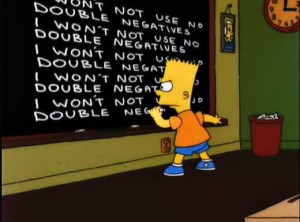Double Negatives: I Don’t Understand Nothing
Maybe you know of someone that uses them often, maybe you use them often, maybe it drives you crazy, or maybe it doesn’t; either way, there’s a right way and the wrong way, so let’s explore.
 A double negative occurs when two forms of negation appear in the same sentence; usually formed when a negative verb (cannot, did not, have not) is combined with either a negative pronoun (nothing, nobody), a negative adverb (never, hardly), or a negative conjunction (neither, nor).
A double negative occurs when two forms of negation appear in the same sentence; usually formed when a negative verb (cannot, did not, have not) is combined with either a negative pronoun (nothing, nobody), a negative adverb (never, hardly), or a negative conjunction (neither, nor).
“I can’t get no satisfaction.” It’s considered a grammatical error, a substandard use of the English language, wrong; and yet, many people not only use them inadvertently, but on many occasions, deliberately. “You haven’t seen nothing yet.” They can be used effectively to either illustrate a point, or to emphasize a statement. “It won’t do you no good.” They are not only present in English, but many other languages, and what’s more, in many languages they are accepted and used very regularly.
In English, two negatives are seen to contradict each other, therefore making the sentence positive. Example: “I don’t have nothing,” that is to say that I have something, for I must have something if I don’t have nothing, right? Well, many languages don’t view negatives in the same way; in Spanish, “I don’t have nothing” is actually a very common phrase, “no tengo nada,” said by many as they try to avoid salesmen. Instead of reversing the phrase and making it a positive statement, the double negative serves to reinforce itself.
What if I told you it was also considered acceptable to use triple negatives in Spanish? Nunca le compra nada a nadie — “She never buys anything for anybody.” We start to get into deeper waters when talking about triple negatives, they’re confusing and can easily be avoided; Groucho Marx once stated “I cannot say that I do not disagree with you,” I’ll give you a minute to work that out.
 So Spanish allows and in some circumstances encourages double negatives, how about other languages? Well, most of the romantic languages share the Spanish view; “Je n’ai aucun ami,” in French is to reinforce the fact that “I have no friends.” In Italian you can say “Voglio mangiare,” or “Non voglio mangiare,” the first stating that “I want to eat,” the second is more precisely “I’d prefer to eat.” In Ancient Greek double negatives follow the principals of English, except that it is perfectly correct to use them; to say “no one was not suffering” is the same as saying “everyone was suffering.”
So Spanish allows and in some circumstances encourages double negatives, how about other languages? Well, most of the romantic languages share the Spanish view; “Je n’ai aucun ami,” in French is to reinforce the fact that “I have no friends.” In Italian you can say “Voglio mangiare,” or “Non voglio mangiare,” the first stating that “I want to eat,” the second is more precisely “I’d prefer to eat.” In Ancient Greek double negatives follow the principals of English, except that it is perfectly correct to use them; to say “no one was not suffering” is the same as saying “everyone was suffering.”
There are slight differences in other languages too, but I’ll let you look into that further, unless of course you feel like “we don’t need no education.”
Can you think of other double negatives that seem to get thrown around often? Do you get upset when people use them?
